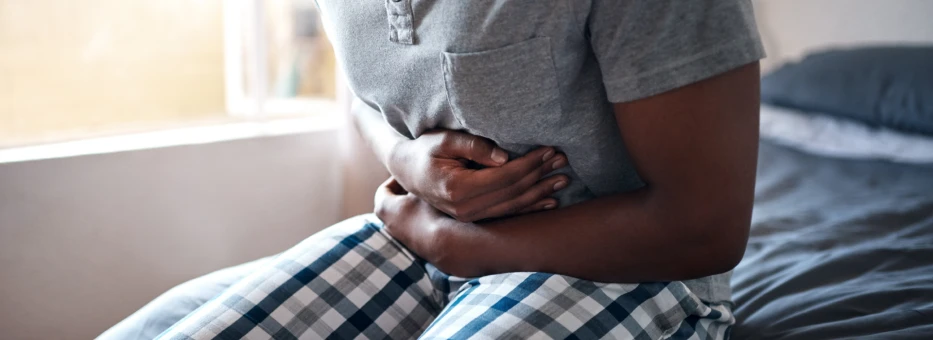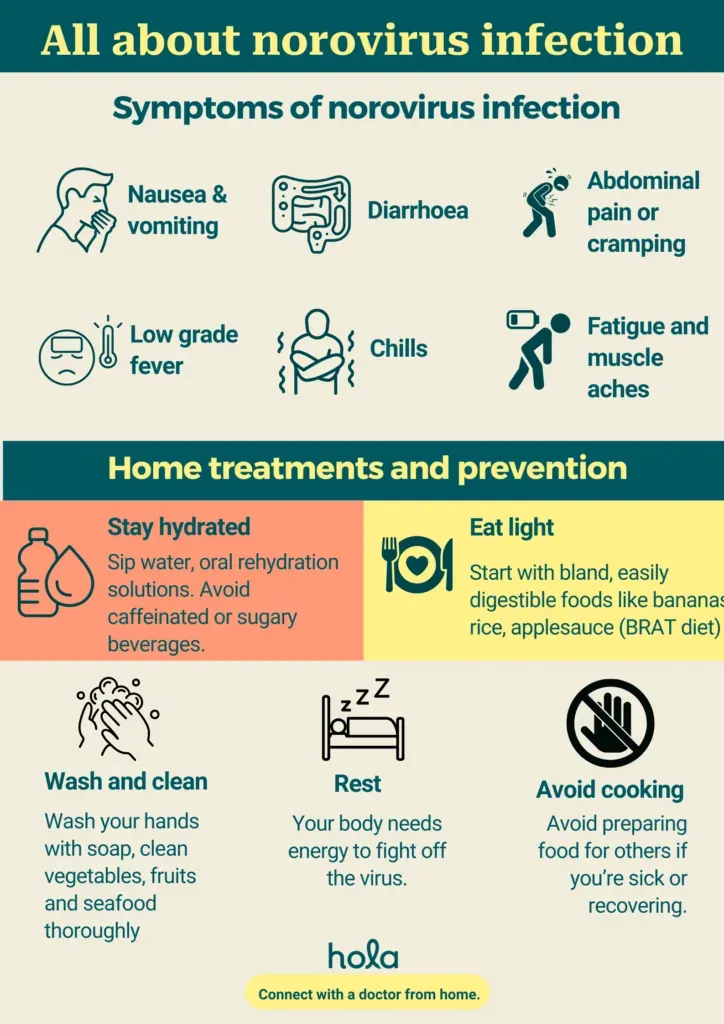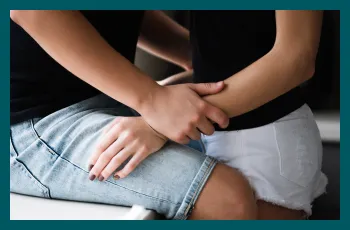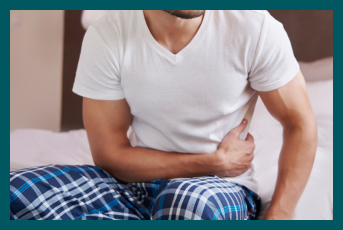Norovirus infection: when to consult a doctor?
Written by the editorial staff writer at Hola. Medically Reviewed by Dr Nelson Lau, MBBS FRACGP, GP & Digital Health Specialist. Dr. Ammar AL-ANI, MBChB, CCBST, AMC. Blog updated on 12 November, 2025. Originally published on 28 December, 2024.

Contents

Overview
Imagine this: one moment you’re feeling perfectly fine, and suddenly you’re overwhelmed with nausea, vomiting, and an intense stomach ache. If this resonates with you, there’s a chance you’ve come into contact with norovirus, commonly referred to as the “winter vomiting bug.” It’s highly infectious, very unpleasant, and has the potential to spread rapidly within families or communities. While most cases clear up in a few days, recognising when it’s time to consult a doctor is critical — especially for children, older adults, and people with weakened immunity.What is a norovirus infection?
Norovirus is an extremely contagious virus that causes inflammation in the stomach and intestines, also known as acute gastroenteritis. It spreads through contaminated food, water, or surfaces, as well as through direct contact with someone who is infected. Despite frequently being labelled as the “stomach flu,” norovirus is not associated with influenza. It specifically affects your digestive system, leading to symptoms such as vomiting, diarrhoea, and abdominal discomfort. Outbreaks are particularly prevalent in environments like schools, cruise ships, nursing homes, and workplaces where people are in close proximity.Causes of Norovirus
Norovirus infection occurs when the virus enters your body through the mouth, usually due to:- Eating contaminated food – such as shellfish, salads, or raw fruits and vegetables handled by an infected person.
- Drinking contaminated water – often from untreated or poorly sanitized sources.
- Touching contaminated surfaces – and then touching your mouth, face, or food.
- Close contact with an infected person – for example, sharing utensils or caring for someone who is unwell.
- Exposure to vomit or stool particles – microscopic traces can carry the virus and spread easily.
Symptoms of norovirus
Symptoms typically manifest 12 to 48 hours after exposure and can include:- Nausea
- Sudden vomiting
- Diarrhoea (watery, non-bloody stools)
- Stomach pain or cramping
- Fatigue and body aches
- Chills or a low-grade fever
Experiencing these symptoms? Speak with a doctor within 15 minutes.
Signs of dehydration
Dehydration is the most significant complication arising from norovirus. Look out for these warning signs:- Dry mouth or chapped lips
- Dark or reduced urine output
- Dizziness or a sensation of light-headedness
- Fatigue or increased irritability
How does norovirus spread
Norovirus spreads easily and can linger on surfaces for several days. The most frequent methods of transmission include:- Contaminated food or water: Consuming food or drinking water that has been prepared by someone who is infected.
- Person-to-person interaction: Shaking hands, sharing utensils, or being in close quarters with an infected individual.
- Touching contaminated surfaces: Surfaces like doorknobs, tables, or phones that harbour the virus.
Risk factors
Anyone can contract norovirus, but certain groups are at greater risk:- Children and elderly individuals
- People in crowded settings such as schools, hospitals, and dormitories
- Those with weakened immune systems
- Individuals handling food or consuming food from unsanitary sources
Home treatments
Most norovirus infections resolve naturally with rest and hydration. You can manage your symptoms at home by following these simple steps: Stay hydrated: Sip on water, clear broths, or oral rehydration solutions like Hydralyte. Rest: Allow your body the necessary time to heal. Eat lightly: Focus on bland, easily digestible foods such as bananas, rice, applesauce, and toast (commonly known as the BRAT diet). Avoid caffeine and alcohol: These substances can exacerbate dehydration.
Prevention tips
Norovirus can spread quickly, but maintaining good hygiene can effectively prevent its transmission.- Thoroughly wash your hands with soap and water, particularly after using the restroom or before meals.
- Use a bleach-based cleaner to disinfect frequently touched surfaces.
- Ensure that fruits, vegetables, and seafood are rinsed thoroughly.
- Do not prepare food for others if you are feeling unwell or in recovery.
When to consult a GP
Seek medical assistance if you experience:- Severe dehydration, limited urination, dry mouth, or dizziness
- Symptoms persisting for more than three days
- A high fever above 38.5°C
- Bloody stools (which are not typical for norovirus)
- Increased susceptibility in infants, the elderly, or individuals with compromised immunity
How Hola Health can help
Feeling too ill to go out? Hola Health’s online doctors can support your recovery from norovirus safely and conveniently. With Hola Health, you can:- Obtain a telehealth consultation with a licensed doctor within minutes.
- Get online prescriptions for nausea relief or hydration assistance.
- Receive medical certificates for work or educational purposes.
- Acquire referrals for additional testing or specialist care, if necessary.
- Access delivery from an online pharmacy for rehydration solutions and medications.
Conclusion
Most norovirus infections resolve with adequate rest and fluid intake, but identifying warning signs early can prevent severe complications. Stay vigilant regarding dehydration, and remember that proper hygiene is your strongest defence against disseminating the virus. If your symptoms do not improve or you are caring for someone at risk, do not hesitate, seek advice from a healthcare provider. With Hola Health, expert online care is just a few clicks away, enabling you to recover safely at home.FAQs
Can antibiotics cure norovirus?
No. Norovirus is caused by a virus, making antibiotics, which are aimed at bacteria, ineffective. The focus of treatment is on hydration and alleviating symptoms.When can I return to work or school after norovirus?
You should remain at home for at least 48 hours after your symptoms have ceased, as you may still be contagious.Is norovirus more severe for young children and older adults?
Yes. These populations face a higher risk of dehydration and complications due to their weaker immune systems. It is advisable to seek prompt medical care if symptoms continue or worsen.How long does norovirus last?
Most individuals recover from norovirus in one to three days. However, the symptoms can be quite severe during that time.How long are you contagious with norovirus?
You are most infectious while experiencing symptoms and for several days following recovery. Some individuals may continue to shed the virus in their stool for up to two weeks. This highlights the importance of consistently washing your hands and refraining from food preparation even after you start to feel better.Need time off to recover? Get your medical certificate online within 15 minutes.
What we treat
- Cough
- Nausea & vomiting
- Fever
- Hayfever
- Fatigue
- Sore throat
- Acne
- Hair loss
- Gout
- Eczema
- Rosacea
- Sunburn
- UTI
- Erectile dysfunction
- Contraception
- Morning sickness
- Morning after pill
- Prostate health
- Anxiety
- Depression
- Stress
- Grief & loss
- Antidepressants
- Premature ejaculation
- Asthma
- Blood pressure
- Blood thinners
- Diabetes
- Cholesterol
- Migraines & headaches
- Allergies
- Body ache
- Heartburn & reflux
- Sleep disorder
- Pain relief
- Gastro
Related Articles
Disclaimer
This blog is for general informational purposes only and does not indicate that Hola Health provides all treatments or preventive measures mentioned. It is not intended to be a substitute for professional medical advice. Always seek the guidance of your doctor or other qualified health professional with any questions you may have regarding your health or a medical condition. For emergencies please immediately contact 000. Any medical topics discussed are intended to educate, not to imply availability through Hola Health.
 Facebook
Facebook  X
X  Copy Link
Copy Link



